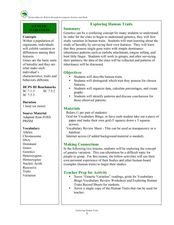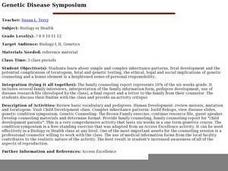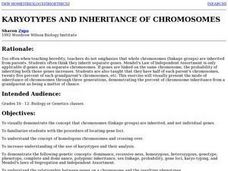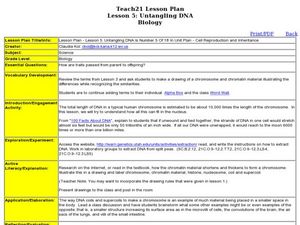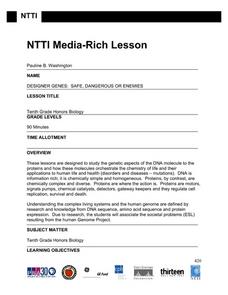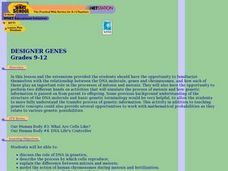LABScI
Genetic Equilibrium: Human Diversity
Investigate the Hardy-Weinberg Principle to explain genetic equilibrium. The 10th lesson plan of a series of 12 is a laboratory exploration of genetic equilibrium. Your classes use a mixture of beans to model allele and genotype...
North Carolina State University
Exploring Genetics Across the Middle School Science and Math Curricula
Where is a geneticist's favorite place to swim? A gene pool. Young geneticists complete hands-on activities, experiments, and real-world problem solving throughout the unit. With extra focus on dominant and recessive genes, Punnett...
Curated OER
Exploring Human Traits
Students explore human behavior by participating in a class science game. In this human characteristics lesson, students identify different human traits that are passed down by each generation and the purpose each of them have. Students...
Curated OER
Genetic Disease Symposium
Students research simple and complex inheritance patterns, fetal development and the potential complications of teratogens, fetal and genetic testing, and the ethical, legal, and social implications of genetic counseling.
Curated OER
The Illusion of Race
This is mostly an exploration of race through an interactive website, class readings, and discussion. Individuals take an online quiz about race, they answer questions on a worksheet by visiting another website, and discover that race is...
Curated OER
Variety is the Spice of Life
Students explore Gregor Mendel's work with genetics. They complete a survey of their friends and family in order to identify dominant and recessive traits. Once their surveys are complete, students discuss the ways in which dominant...
Curated OER
Karyotypes and Inheritance of Chromosomes
Students explore the mode of inheritance of chromosomes. Given a scenario, students use the Human Genome sheet to determine inherited chromosomes. They illustrate the difference between genotype and phenotype. Students develop a model...
Curated OER
Bioethics and Humans
Young scholars evaluate "humanity" and conditions associated with it. In this activity lesson students take on issues and construct their own limitations by defining the "human" condition.
Curated OER
Inherited Traits
Students work with a partner to complete an inventory of their traits and compare and discuss their unique qualities. In this biology lesson, students determine percentages for the frequency of observed traits of classmates, compile the...
Curated OER
Tracking Down Traits
Sixth graders list traits that all sixth graders share. They receive worksheets "Tracking Down Traits," working in groups to complete the chart. Students share results with the class and a class summary is tallied. Students discuss the...
Curated OER
Lesson 5: Untangling DNA
Students extract DNA from split peas. In this biology lesson, students research how chromatin form into chromosomes. They draw the stages and present their work in class.
Curated OER
Global Awareness
Students read about how scientists are arriving at current theories of human origin and migration through mitochondrial DNA analysis. They then piece together a map showing the data from mitochondrial DNA analysis to plot the migration...
Curated OER
Natural Selection
High schoolers observe, measure and record variations that may be due to genetic inheritance. They look at the length of seeds for germinating pinto and lima beans and measure the distance between eyes in humans. They graph and discuss...
Curated OER
A Tasteless Tasty Test
Students review the inheritance patterns of simple dominant and recessive traits in humans. They use PTC tasting as a model trait. Each student determines whether or not they are a taster using PTC paper then they compile and discuss the...
Curated OER
Temperature and the Tomato
You will need a photovoltaic system and monitor at your school in order to obtain all of the data required to thoroughly implement this lesson. Your class monitors daily temperature and insolation amounts over a two week span of time....
Curated OER
Designer Genes
Students view a video on DNA. They discuss mitosis, meiosis and fertilization. They use strips of paper to simulate fertilization and analyze the genotype and phenotype of the combined chromosomes.
Curated OER
Simulation of Gene Splicing
Students use the exercise as a prelude to a "wet" lab or as a substitute for such a lab. It correlates well with colony transformation labs. This lab is recommended for students what have difficulty with the abstractions that genetic...
Curated OER
Cancer Causes
Students explore why people get cancer. They explore human cells by taking a close examine their own. take a small sample of the epithelial cells that line the inside of their mouth. They glimpse how scientists investigate inside cells.
Curated OER
Simulation of Gene Splicing
Learners simulate gene splicing by examining bacteria. They create a bacterial DNA into which they insert the human DNA (gene) that codes for growth hormone. They cut the sites of the enzyme to study how the human DNA can be joined to...
Curated OER
Last Flight of Bomber 31
Students act as forensic scientists to help solve a long-standing missing persons case. They study nuclear DNA and mtDNA.
Curated OER
Here's Looking at You
Students assess some common inherited traits which are easily observable and note their phenotype for the trait. Students compare their phenotypes to those of their parents and attempt to describe the pattern and manor of inheritance.
Curated OER
Mendelian and Non-Mendelian Heredity
Tenth graders discuss their physical features, and why they look the way they do. They listen as the teacher discusses DNA, alleles, and dominant or recessive genes. Students perform an experiment with different colored markers...
Curated OER
DNA and RNA
Tenth graders research the history and discovery of DNA. Using their text, they label a basic DNA structure and the composition of genes. They explain how RNA and DNA differ from one other and discuss the processes of transcription and...
Curated OER
What can I do?
Students identify feelings and explore positive ways to handle conflict. In this mental health lesson students discuss feelings and how to constructively handle them.


